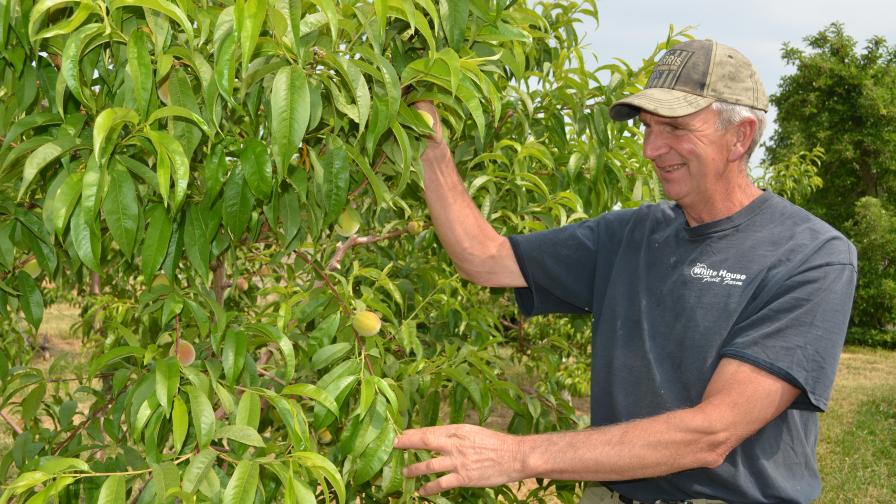Good Save: Peach Growers in Ohio Work Hard To Overcome Adversity

This season’s peach crop in Ohio faced multiple production challenges. Growers adjusted to the adversity and it is paying off. White House Fruit Farm’s David Hull happily shows his crop in early June in anticipation of a beautiful harvest in July and August.
Photo by Gary Gao, The Ohio State University
Nothing beats ripe peaches off the tree in August in Ohio. This is why growers grow peaches despite many challenges. Over last winter, high winds and temperatures that dipped below zero made this season another tough one for many peach growers and a decent one for only a select few.
In June I traveled to two farms, Patterson Fruit Farm in Chesterland and White House Fruit Farm in Canfield. I met with David Hull of White House Fruit Farm and Dave Patterson of Patterson Fruit Farm. They are among a handful of peach growers who boast a peach crop in Ohio in 2023. I was very intrigued by their operations.
Here are a few of their keys to success.
KEY 1: LOCATION
White House Fruit Farm sits on an elevation of about 1,200 feet — high for Ohio. The site is too far from Lake Erie to get any protection from it, so they depend on that elevation. I also noticed their peach orchard is surrounded by some large, mature trees as wind breakers on several sides. Their soil is mostly clay loam.
“We grow our peach trees on raised beds,” says Hull, explaining that raised beds improve soil drainage and tree health. Patterson Fruit Farm is much closer to Lake Erie and gets quite a bit of protection from the lake. Their peach flower buds are not hurt as much as others. Patterson says they still have to protect their peach flowers from frosts during bloom.
KEY 2: VARIETY SELECTION
Hull says they have tried many different peach cultivars, and dependable production is the most important selection criterion for him. ’Contender’, ‘PF-17’, and ‘Red Haven’ are three of the most dependable cultivars on his farm. Hull says these three cultivars tend to have a much higher survival rate of flower buds through Ohio’s challenging winters.
Patterson says he, too, finds ‘Red Haven’, which has been around for many years, to be the most dependable cultivar.
Most people will have likely forgotten what awful winter and spring weather Ohio had this year, but not my good friend Mark Schmittgen. An outstanding fruit grower, I have known Schmittgen, the Co-owner of Heartland Orchard in Thorneville, OH, for more than 30 years.
“Temperatures around -3°F to -7°F and wind speeds of 30 mph out of the west for three days, right before Christmas in 2022, desiccated many peach flowers,” Schmittgen says. “Some have bloomed out. We did get a few ‘Belle of Georgia’ and ‘Golden Jubilee’.
His orchard sits on top of a hill at an elevation of 1,200 feet. The high elevation helped, but he did not have much protec-tion from wind.
“Looking back, I wish that I had planted my peach trees in a more protected area
of the farm, not the very top of the hill,” Mark says.
KEY 3: ACTIVE FROST PROTECTION
Everything depends on how low the temperatures are. Hull says air temperatures got down to about 29°F when his peach trees were in full bloom. His peach trees started blooming around April 12, and he used a portable wind machine during some cold nights.
“One smaller machine protects about 1 acre,” he says. “We do have bigger wind machines for our apple trees; bigger wind machines can protect about 2 to 3 acres.”
Another method of active frost protection is overhead irrigation with sprinkler. Most orchards in Ohio are not set up for this method, but Patterson Fruit Farm is an exception. Patterson says they use overhead irrigation for frost protection of their fruit crops. This approach requires a lot of water, and all that water makes fields quite muddy. However, having a crop to harvest is well worth all that pain.
KEY 4: VIBRANT AGRITOURISM
I spoke with Patterson about their agritourism business. Patterson Fruit Farm has three divisions: Patterson’s Farm Market (year-round), Orchard Hills Center for special events, and Patterson Farms and Mulberry location for school tours and educational events.
Patterson says it is critical for them to have a strong agritourism business to smooth out the dips on the production side.
“Do not get me wrong. We would rather have a crop though,” he says. Patterson is incredibly happy they have a peach in 2023, even though it may not be a full crop.










